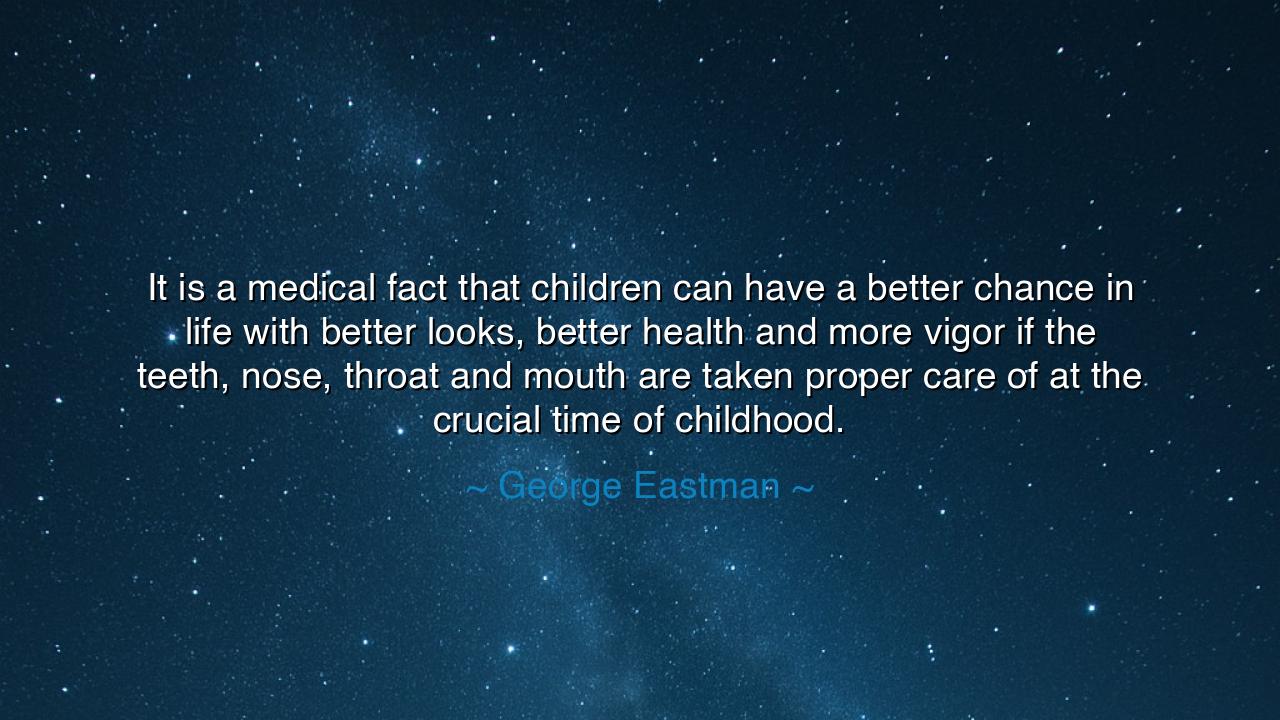
It is a medical fact that children can have a better chance in
It is a medical fact that children can have a better chance in life with better looks, better health and more vigor if the teeth, nose, throat and mouth are taken proper care of at the crucial time of childhood.






When George Eastman declared, “It is a medical fact that children can have a better chance in life with better looks, better health and more vigor if the teeth, nose, throat and mouth are taken proper care of at the crucial time of childhood,” he spoke not only as a patron of science but as one who understood the deep connection between the body’s foundation and the spirit’s ascent. His words shine with a wisdom too often overlooked: that the smallest details of care in early years shape the strength, confidence, and destiny of the human being.
The meaning of this insight rests in its focus on the mouth, the teeth, the throat—organs so common they are taken for granted, yet so vital that they influence not only appearance but the very vigor of life. To breathe freely, to speak clearly, to smile without pain or shame — these are gifts that open doors to opportunity. Neglect them in childhood, and the whole course of a life may be shadowed. Eastman’s words remind us that destiny often depends not on grand events but on the careful tending of the body at its roots.
The origin of such a declaration lies in Eastman’s devotion to philanthropy. Though remembered as the founder of Kodak, he was equally renowned for his gifts to medicine and education. He funded dental clinics for poor children, believing that the health of the young was a sacred trust, and that by ensuring their teeth and mouths were cared for, he gave them more than medicine — he gave them confidence, vigor, and the chance to thrive. Thus, his words are not theory but testimony: he invested his fortune in the truth he proclaimed.
History offers examples that echo Eastman’s wisdom. In ancient Sparta, infants were examined for strength and health, and though their practices were harsh, the principle endured: the foundation of society rests on the well-being of its children. In Rome, physicians such as Galen wrote of the importance of diet and hygiene in youth, knowing that strong bodies produced strong citizens. Eastman stands in this lineage, not as a conqueror or philosopher, but as a benefactor who saw that the greatness of a nation is born from the childhood it protects.
The lesson is both practical and profound. If we wish to shape lives of vigor and promise, we must begin where life itself begins: with the child. Nourish them, tend their health, protect their mouths and throats, for these are the gates of breath and speech, of nourishment and of confidence. To neglect them is to burden the future with weakness; to care for them is to gift the world with strength. Eastman teaches us that greatness is not only forged in schools or in fields of labor, but also in clinics, in hygiene, in the simple but profound act of caring for the body’s early needs.
For us, the teaching is clear: honor the crucial time of childhood. Invest in the health of children, not only your own but all within your community. Support clinics, teach hygiene, encourage habits of care. See in every child not only a mouth to be cleaned, but a life to be empowered. Every smile preserved, every illness prevented, is a victory not just for one, but for the generations they will touch.
Thus, let Eastman’s words endure as guidance: the strength of a society is written in the teeth, the health, the vigor of its children. To protect these in their youth is to plant seeds of greatness; to neglect them is to allow frailty to take root. May we, like Eastman, recognize that even the smallest acts of care can echo across lifetimes, shaping futures with a power far greater than we imagine.






AAdministratorAdministrator
Welcome, honored guests. Please leave a comment, we will respond soon